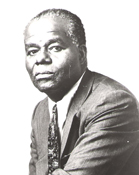 This Goodly Land
This Goodly Land
John Henrik Clarke (January 1, 1915–July 16, 1998)

Other Names Used
- John Henry Clark: birth name
Alabama Connections
- Union Springs, Bullock County: birthplace, early childhood residence
Selected Works
- Clarke, John Henrik. Rebellion in Rhyme. Prairie City, Ill.: Decker Press, 1948. Rpt. Trenton, N.J.: Africa World Press, 1991.
- Clarke, John Henrik. Africans at the Crossroads: Notes for an African World Revolution. Trenton, N.J.: Africa World Press, 1991.
- Clarke, John Henrik. Christopher Columbus & the Afrikan Holocaust: Slavery & the Rise of European Capitalism. Brooklyn: A & B Books, 1992.
- Clarke, John Henrik. African People in World History. Baltimore: Black Classic Press, 1993.
- Clarke, John Henrik. My Life In Search of Africa. Ithaca, N.Y.: Cornell University, 1994.
Biographical Information
John Henrik Clarke was born in Union Springs, Ala., to a family of sharecroppers. When a storm destroyed the family’s home, they moved to Columbus, Ga. Clarke was a good student, but he had to leave school after the eighth grade in order to work. In 1933, he rode a freight train to New York where he settled in Harlem and worked odd jobs to support himself. Clarke had become interested in black history from listening to his great-grandmother’s stories, and he made use of the New York public libraries to further his education. He also joined the Harlem History Club which met weekly for lectures and discussions. Clarke began writing poetry and short stories in the 1930s. His first published short story, “On the Other Side,” appeared in Opportunity magazine in 1938. Clarke served in the US Army Air Forces from 1941 to 1945. After his discharge, he returned to Harlem and began taking classes at New York University. Clarke was active in the Harlem Writers Guild and published a book of poetry in 1948. He was also a founder and editor of the Harlem Quarterly. In 1957 and 1958, he published a series of articles, ”Lives of the Great African Chiefs,” in The Pittsburgh Courier. In the summer of 1958, Clarke traveled to Africa, where he visited Ghana and Nigeria and wrote for the Ghana Evening News. When he returned to New York that fall, he published articles based on his observations during the trip.
Clarke was a pioneer in the movement to develop African studies programs. He began teaching at the New School for Social Research in 1956. Clarke served as the director of the Heritage Teaching Program of Haryou-Act (Harlem Youth Associated Community Teams) from 1964 to 1969. From 1967 to 1970, Clarke taught African history at Cornell University. He began teaching at Hunter College in 1970 and continued there until 1985. In the 1960s and 1970s, Clarke edited collections of works by and about black writers and activists. He was an editor at Freedomways magazine from 1962 until 1983. In the 1990s, Clarke published several books of essays on topics related to the Pan-Africa movement, also called Afrocentrism. In his later years, Clarke suffered health problems but continued lecturing and studying. He was awarded the Carter G. Woodson Scholar’s Medallion in 1995 by the Association for the Study of African American Life and History. In 1996, his short story “The Boy Who Painted Christ Black” was filmed as part of an HBO production, America’s Dreams. Clarke died in New York of a heart attack at age eighty-three.
Interests and Themes
John Henrik Clarke wrote poems and short stories about the experience of being a black American in the twentieth century. His nonfiction includes essays on topics related to the Pan-Africa movement, also called Afrocentrism.
For More Information
Please check your local library for these materials. If items are not available locally, your librarian can help you borrow them through the InterLibrary Loan program. Your librarian can also help you find other information about this author.
There may be more information available through the databases in the Alabama Virtual Library. If you are an Alabama citizen, AVL can be used at your public library or school library media center. You can also get a username and password from your librarian to use AVL at home.
Reference Books
- Adams, Barbara Eleanor. John Henrik Clarke: Master Teacher. Brooklyn: A & B Publishers Group, 2000.
- Adams, Barbara Eleanor. John Henrik Clarke: The Early Years. Hampton, Va.: United Brothers and Sisters Communications, 1992.
- Conyers, James L., and Julius E. Thompson, eds. Pan African Nationalism in the Americas: The Life and Times of John Henrik Clarke. Trenton, N.J.: Africa World Press, 2004.
- Swanston, Anna. Dr. John Henrik Clarke: His Life, His Words, His Works. Atlanta: IAM Unlimited Pub., 2003.
Reference Articles
- Boyd, Herb. "In Memoriam: Dr. John Henrik Clarke (1915-1998)". The Black Scholar 28.3/4. (2001): 50-52.
- Boyd, Herb, and Sharon Fitzgerald. "The Powerful Legacies of Two Giants". American Visions 13.5. (1998): 30-33.
- Carruthers, Jacob H. "John Henrik Clarke: The Harlem Connection to the Founding of Africana Studies". Afro-Americans in New York Life and History 30.2. (2006): 173-194.
- Newman, Richard. "John Henrik Clarke". Transition 77. (1998): 4-8.
Reference Web Sites
- Acree, Eric Kofi. "John Henrik Clarke: Historian, Scholar, and Teacher". John Henrik Clarke Africana Library. 2004. Cornell University Library. http://www.library.cornell.edu/africana/clarke/.
Location of Papers
- Schomburg Center for Research in Black Culture, New York Public Library
Photo courtesy of the Caroline Marshall Draughon Center for the Arts & Humanities in the College of Liberal Arts, Auburn University.
Last updated on May 30, 2008.